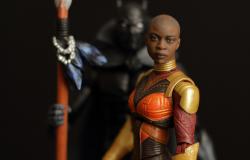Wakanda, Afrofuturism, and Decolonizing International Relations Scholarship

As the highly-anticipated film Black Panther is released in cinemas, Yolande Bouka discusses Afrofuturism tugs firmly on black memory, recalling the role of Africans in contemporary International Relations.
Next week, Marvel Studios will release one of its most anticipated films in the studio’s ten-year history. Black Panther, set in the fictional Wakanda, a vibranium resource-rich and technologically advanced African country, has shattered records by selling more advance tickets than any previous superhero movie. Part of Black Panther’s success can be attributed in part to the expansion of Marvel’s Black fan base. Black people around the world–most of whom are not traditional Marvel fans–have put their whole weight behind the film. While Marvel’s Comic Universe has featured superheroes of color for decades now, the release of Black Panther in Marvel’s Cinematic Universe breaks new ground in the cinematographic comic industry. By grounding the plot in Africa while simultaneously showcasing a predominantly Black cast and production team, Black Panther is unique. All this is happening at a time where Afrofuturism, an artistic movement that combines “elements of science fiction, magical realism, and African history,” is exploding.
Marvel’s Black Panther tingles the imagination, but it also tugs firmly on Black memory. First, King T’Challa’s all-female personal security, the Dora Milaje, brings to the fore African women that demonstrate the capacity to make security-related decisions. In real-world international relations, African women are often neglected, infantilized, or essentialized as victims. This seems ironic, as African women have always had a role to play in the security of their communities, and do so in various capacities. Without minimizing the distinct ways in which women suffer during conflicts or romanticizing their participation in armed rebellions, Okoye, the leader of the Dora Milaje, can remind us of the well-documented all-female combat units of Africa such as the Mino of the Dahomey Kingdom (Benin), and the female legions of the Kingdom of Monomotapa (Zimbabwe). Second, as we anticipate the fictional Wakandan army fighting on the African continent alongside a plethora of other superheroes in Marvel’s upcoming Avengers: Infinity War, I cannot help but think of the many Black bodies who have served, fought, and died during both World Wars, on the continent and abroad. But more importantly, I am reminded of how their participation shaped contemporary international relations.
During the Second World War, countries like France and Britain relied heavily on African natural resources to fund and support the war. Various African coastal cities were strategic restocking and equipment assembly points for military supply. Equally important, and effectively erased from the War narrative, is the fact that, in addition to Black soldiers from Canada, the United States, and the Caribbean, over a million Africans fought under British, French, Belgian, Italian, and Ethiopian flags and bolstered the Allied forces ranks at critical times during the War. Many soldiers were conscripted into colonial armies, while some volunteered, often encouraged or compelled to enlist by their local chiefs. These men fought in Africa, in Europe, and all the way into the islands of the Pacific. For example, in 1943 more than 90, 000 West African troops–half of them Nigerians–were deployed to Burma and helped push the Japanese out. Moreover, as Allied troops were being evacuating in Dunkirk, most French West African troops were in position awaiting the German assault on the Somme. Thousands of those Africans would be captured and then massacred by the German soldiers between May and June of 1940.
After the War, Britain and France continued to rely on colonial troops to maintain their hold on key colonies. France used West African soldiers during the Indochina War to fight against nationalist Viet Minh troops. The British sent African troops from Malawi, Zambia, and Kenya to suppress a rebellion against the Malayan National Liberation Army.
Some may ask: “why do the roles of Africans in World War II and other events matter, and what does it have to do with how we study and understand international relations?”
There is a scholarly consensus that participation of Black men and Black women during World War II was pivotal in the mobilization of self-determination movements in Africa and accelerated civil rights activism in the United States. Also, war veterans such as Léopold Sédar Senghor of Senegal and Idi Amin of Uganda became heads of some of these new African states. But there is more. My colleague Cullen Hendrix recently discussed how events like World War II have not only received a disproportionate level of coverage in international relations scholarship, but in security studies, more specifically, they have become the prisms through which many scholars understand conflicts. If the second World War, however unique in its scale and context, has shaped how we theorize about international politics and security, then we must ask ourselves: what is missing from our analytical frameworks, when we do not seriously consider how African actors and agency, and the violent ways African bodies were used influenced the War’s dynamics and how power is presently conceptualized and used in post-colonial Africa?
While historians and comparativists have investigated these events, few in IR theory–which at the moment is dominated by Western scholars–consider such dynamics seriously in their research. Traditional IR theory’s fixation with the modern state is part of the problem. Modern African states did not emerge until the 1960’s after regaining their independence from European countries. While there were numerous kingdoms and states in pre-colonial Africa, for most of the 19th and 20th centuries African societies were considered mere annexations to European states. Today, unfortunately, part of the field of IR continues to be influenced by an intellectual tradition of anti-blackness through the erasure of centuries of power consolidation and state formation and other types of social organizations that predate colonialism. IR is not blind to race. For example, Zoltàn Búzás has theorized about the impact on race and threat perception in international security. Yet, IR struggles to face its own racial bias by failing to examine African states and political actors as independent historical subjects, and not simply objects in the dominant global structure.
This propensity to minimize African actors was all too evident during the Cold War when the importance of proxy wars was often analyzed through the lens of bipolarity. Moreover, Western bias in the reading of history and distribution of power in international relations scholarship has continuously erased important events from our understanding of global affairs. This was the case following the stalemate at the battle of Cuito Cuanavale (1987-88) during the Angolan Civil War and the Namibian War of Independence. The battle, which was the most important conventional military engagement in Africa during the Cold War era, pinned Angolan troops and Namibian rebels with the backing of Cuban forces and Soviet advisers against the South African Defense Forces and Angolan rebels who were backed by the Reagan and Thatcher administrations. The inability of either side to win the battle, after engaging in over a decade of military confrontation, was a turning point in Southern African politics and the Cold War. The stalemate at Cuito Cuanavale pushed the Apartheid government to the negotiation table, which resulted in Namibia’s independence and later opened the door for democracy in South Africa.
Even today, too many Western IR scholars fail to consider African political actors as full agents. For example, the bulk of the analysis on Africa-China relations critiques China’s exploitation of African natural resource or the impact of China’s development assistance on some African countries human rights records. However, grounding the discipline in a more global perspective could, for instance, interrogate the myriad ways in which Africa states and non-state actors have chosen to interact with China and how such interactions have contributed to changing the world order. Could Africa be that important to international relations in a nonfictional setting?
Decolonizing IR scholarship goes beyond simply including more people of color in our syllabi. In addition to questioning the dominance of western epistemology and methodology, previous intellectual anti-colonial movements have emphasized the need to fight the pervasive erasure of political actors of color and their contributions. It does not involve merely mentioning them in passing. In IR, it also demands that we re-examine their relationships with contemporary political and security architectures and the latter not be taken for granted. Critical security theory begins to question the production of conventional knowledge in the discipline by interrogating the social, historical and political roots of that knowledge. But this practice needs to permeate the entire field.
In the meantime, Afrofuturism and Black Panther offer us the opportunity to interrogate how we understand the historical events of the past in a dramatically emancipatory way. I for one have already purchased my tickets. Not because I need to imagine a world where a fictional country in Africa named Wakanda matters. I have done so because I know that Africa, its Black minds, its Black voices, and its Black bodies have always mattered.
Dr Yolande Bouka (@yolandebouka) is a postdoctoral fellow at Sié Chéou-Kang Center for International Security and Diplomacy at the Josef Korbel School of International Studies at the University of Denver.
This was reposted from Africa @ LSE. It was first published on the Political Violence @ A Glance blog.
Image credit: Hannaford via Flickr (CC BY-SA 2.0)


